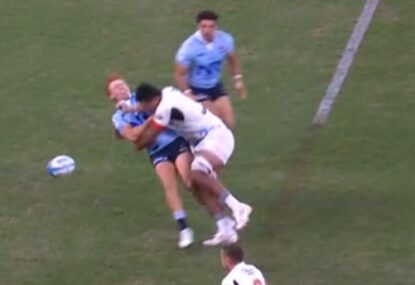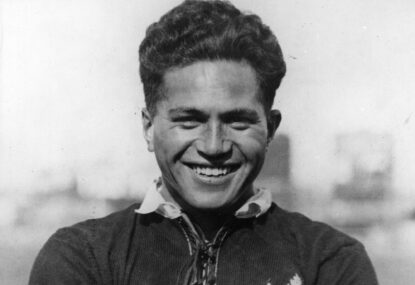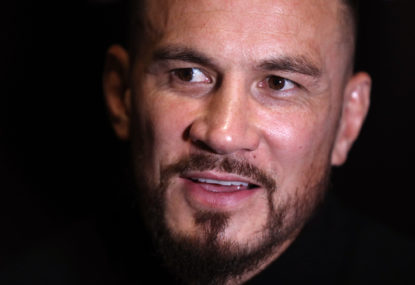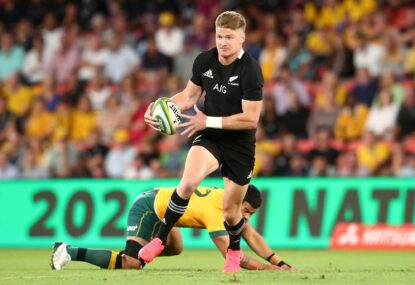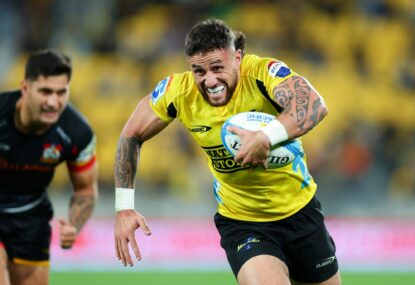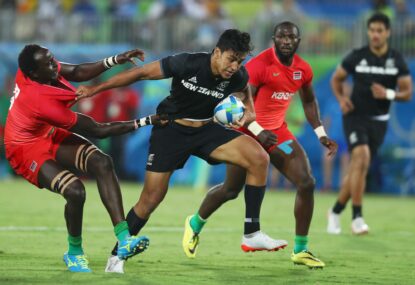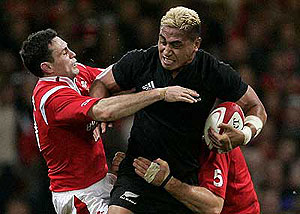
Schalk Burger is absolutely loving this, playing the All Blacks without Jerry Collins breathing down his neck. The absence of Richie McCaw is another matter.
McCaw would be making our pack’s work at the breakdown more efficient, linking between the forwards and backs more effectively, and supporting the ball carrier like no one else can.
But of recent All Blacks, only Collins would be able to inflict the sort of damage Burger is capable of, and the big blond gorilla is punishing the lighter New Zealanders with great relish now he has officially the hardest nut on the park.
Collins was once described as looking like a black stocking full of golf balls. The physical toll he took on his enemies was immense.
With him terrorising the opposition and making them flinch when approaching contact, the All Blacks enjoyed a psychological edge even over such brutes as Sebastian Chabal.
That edge is gone, and Schalk Burger has inherited the mantle of world’s meanest. He hurls himself into the fray like a berserker, and any men who don’t instinctively duck under his swinging arms often wake up seeing stars.
Collins used to sort him out in the first half hour, catching him under the chin with the top of the head, forcing him to lower his sights and tackle properly if he didn’t want to bite off his own tongue.
But no All Blacks at present seem to have the stomach for it. Ali Williams went in sideways at Carisbrook, hesitantly … losing momentum before the collision, just like he did against Chabal last year. And once again he came off second best.
Sione Lauaki is physically equipped to take Burger on, but the All Blacks risk too much of the finesse necessary against serious, Tri Nations opposition if they dare to start him.
In other words, we’re stuck with trying to out-manoeuvre the Springboks now that we can’t outmuscle them, so when we lack the touch of McCaw and our breakdown work suffers we’re in trouble.
That’s my take on what happened at Carisbrook, where the All Blacks ended a ten year unbeaten record at home against the Springboks on Saturday night. It might (once again) sound arrogant to assert that this was a game the All Blacks could and probably should have won, but it was certainly there for the taking.
Within twenty minutes, however, Burger had flattened the pivotal Dan Carter and Williams our lineout lynchpin with withering high shots, and the All Blacks were unable to reply in kind because they lacked a hitman suitable for the job, someone to bust Burger’s mouthguard loose half full of teeth … plus, they tend not to respond aggressively enough to such tactics these days, probably taking their roles as ambassadors a little too seriously.
No paunchy middle-aged desk jockey should feel comfortable suggesting that ANY current All Black might lack the necessary amount of mongrel, but it wouldn’t be too much of a stretch to suggest that whatever mongrel the All Blacks DO possess isn’t being properly harnessed or encouraged.
Was the sidelining of Brad Thorn enough to take virtually all our aggression away? The Springboks are abrasive at the best of times, abrasive enough to make some opponents leery and many look like pussies. But not the All Blacks, surely?
The 30-28 loss in Dunedin should be a wake-up call. The All Blacks were ripped apart up the middle, and although some players such as Mils Muliaina at fullback were simply heroic, if we have to look to numbers as high as fifteen before we find someone having a good game then something’s wrong.
It doesn’t matter how brilliant Carter and his midfielders or three-quarters are, if they’re getting untidy ball from set piece and slow ball going backwards at ruck time, they’ll look like an English backline in a heartbeat.
The test was a fierce spectacle at least, despite the predations of Australian officials. Matt Goddard and his girlfriends James Leckie and Paul Marks were intrusive and out of their depth.
If Paddy O’Brien’s agenda was to showcase the ELVs he couldn’t have chosen a worse threesome, but at least when the out-of-breath Goddard remembered to remove the whistle from his mouth while running the two teams displayed a great appetite for running rugby.
It was frantic stuff, largely error-free, with every phase hotly contested. Some mystifying rulings at the breakdown were unwelcome punctuations, and the liberal sprinkling of penalties instead of freekicks provided most of the scoring opportunities, but the crowd saw great fluidity when the pace of play left the florid and sweaty Goddard behind. Somehow, luckily, infringements balanced out so the whistle tended to favour no particular team.
The Springboks took a 14-12 lead with the first try, Joe van Niekerk running blind off the back of an attacking scrum and putting JP Pietersen in at the corner, then Butch James soon dropped a neat goal to extend the margin. Carter’s fifth penalty made the half-time lead 17-15 to the visitors.
The All Blacks regained the lead with a terrific try after the interval, replacement Lauaki finishing when first centre Conrad Smith and then halfback Andy Ellis drew tacklers but kept their arms free for offloads. A long series of drives had seen the All Blacks sweep upfield, most of the fifteen men handling and advancing as continuity was maintained through multiple phases.
Two more three-pointers apiece were exchanged, including a snapped dropkick from Carter off-balance. At 28-23, the game was still poised on a knife edge.
Then Springbok half Ricky Januarie, who had been successfully probing gaps around the fringes of the ruck all night, made the decisive play. Selling Keven Mealamu and Ellis his opposite a giant dummy, he galloped through a gaping hole. Chipping Leon MacDonald easily, the bounce favoured him and he scored the match-winner.
There were a few minutes left to try and set Carter up for a winning dropkick, but the All Blacks could not do it. It takes a big pack sucking in lots of defenders to set up a sure pot, and that kind of muscle was beyond the New Zealanders at the death just as it had been all night against the huge Africans.
What we’re now searching for is a number six of genuinely intimidating size and demeanour, someone to compliment the skills and workrate of McCaw and Rodney So’oialo.
We have plenty of fast flankers, stars of seven-a-side like Adam Thomson and Liam Messam, and there is talk this week of elevating Daniel Braid to the role of specialist openside during McCaw’s convalescence.
But Braid won’t cut it.
Neither would any other conventional fetching breakaway, brought in to fill that role when So’oialo can cover it quite adequately.
I don’t even see why they think a fetching number seven is the answer to their problems. What we need is another beast like Collins, and if we can’t find one then a specialist number six with real size.
I have no idea why the selectors snubbed Collins with such finality this year. Some say it’s because he told Graham Henry he wasn’t happy with McCaw as a captain, which if true was a pretty stupid thing to say.
But with Jerry gone, for whatever reason, we need the next best thing at least.
They didn’t seem to want Kieran Read either, their reasoning equally unclear, so it’s beyond me what they’re thinking if Chris Masoe is who they initially bring in to cover McCaw but then they also elevate Braid. Is it just against Australia that they need him, and are the ELVs really so significant a factor?
McCaw should be back by the time we play South Africa again (Cape Town, August 16th), but meanwhile a search should begin in earnest for the next Jerry Collins.































































































